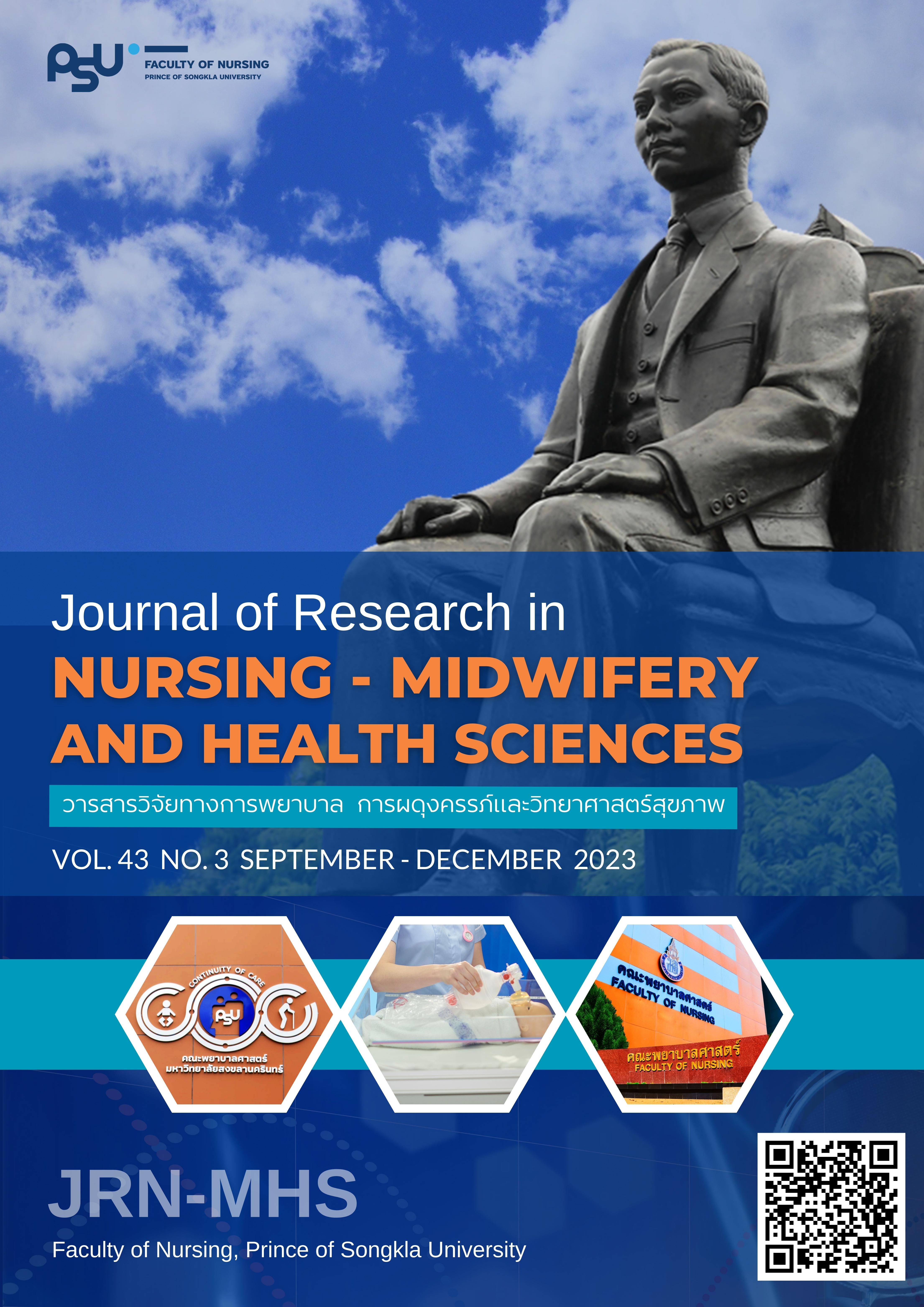ผลของการเรียนรู้ด้วยสถานการณ์จำลองต่อความรู้ และความมั่นใจในตนเองในการปฏิบัติการพยาบาลผู้ป่วยภาวะหัวใจขาดเลือดเฉียบพลันที่แผนกฉุกเฉินของนักศึกษาพยาบาล
Main Article Content
บทคัดย่อ
วัตถุประสงค์: เพื่อศึกษาผลของการจัดการเรียนรู้ด้วยสถานการณ์จำลองต่อความรู้และความมั่นใจในตนเองในการปฏิบัติการพยาบาลผู้ป่วยภาวะหัวใจขาดเลือดเฉียบพลันที่แผนกฉุกเฉินของนักศึกษาพยาบาล วิธีการศึกษา: การวิจัยกึ่งทดลองแบบกลุ่มเดียววัดผลก่อนและหลังการทดลอง กลุ่มตัวอย่าง คือ นักศึกษาพยาบาลชั้นปีที่ 3 จำนวน 52 ราย ได้รับการจัดการเรียนรู้ด้วยสถานการณ์จำลองในการปฏิบัติการพยาบาลผู้ป่วยภาวะหัวใจขาดเลือดเฉียบพลันที่แผนกฉุกเฉิน เก็บรวบรวมข้อมูลระหว่างเดือนพฤษภาคม-มิถุนายน 2565 โดยโปรแกรมการเรียนรู้ด้วยสถานการณ์จำลองพัฒนาภายใต้กรอบแนวคิดทฤษฎีการเรียนรู้จากประสบการณ์ของโคล์บ ร่วมกับกรอบแนวคิดการศึกษาทางการพยาบาลด้วยสถานการณ์จำลองของเจฟฟรีย์ประกอบด้วยกิจกรรมการเรียนรู้ 5 ขั้นตอน ดังนี้ (1) การศึกษาสื่อการเรียนรู้ด้วยตนเองเกี่ยวกับการปฏิบัติการพยาบาลผู้ป่วยภาวะหัวใจขาดเลือดเฉียบพลันที่แผนกฉุกเฉินและการบันทึกคลื่นไฟฟ้าหัวใจก่อนเข้าร่วมกิจกรรม (2) การร่วมกิจกรรมสรุปความรู้และเนื้อหาสาระสำคัญเกี่ยวกับการปฏิบัติการพยาบาลผู้ป่วยภาวะหัวใจขาดเลือดเฉียบพลันที่แผนกฉุกเฉิน (3) การฝึกทักษะการบันทึกคลื่นไฟฟ้าหัวใจ (4) การปฏิบัติการพยาบาลผู้ป่วยภาวะหัวใจขาดเลือดเฉียบพลันที่แผนกฉุกเฉินในสถานการณ์จำลอง เป็นเวลา 60 นาที และ (5) การสรุปผลการปฏิบัติและการสะท้อนคิดการเรียนรู้เป็นเวลา 30 นาที โปรแกรมเรียนรู้ด้วยสถานการณ์จำลองมีค่าดัชนีความตรงเชิงเนื้อหา เท่ากับ .95 เครื่องมือในการเก็บรวบรวมข้อมูล ได้แก่ (1) แบบวัดความรู้ในการปฏิบัติการพยาบาลผู้ป่วยภาวะหัวใจขาดเลือดเฉียบพลันที่แผนกฉุกเฉิน มีค่าดัชนีความตรงเชิงเนื้อหาเท่ากับ .89 และมีค่าความสอดคล้องภายใน (KR-20) เท่ากับ .78 (2) แบบสอบถามความมั่นใจในตนเองในการปฏิบัติการพยาบาลผู้ป่วยภาวะหัวใจขาดเลือดเฉียบพลันที่แผนกฉุกเฉินมีค่าดัชนีความตรงเชิงเนื้อหา เท่ากับ .92 และมีค่าความเที่ยง เท่ากับ .88 ผลการศึกษา: พบว่า ค่าคะแนนเฉลี่ยความรู้ และความมั่นใจในตนเองในการปฏิบัติการพยาบาลผู้ป่วยภาวะหัวใจขาดเลือดเฉียบพลันที่แผนกฉุกเฉินภายหลังการเรียนรู้ด้วยสถานการณ์จำลองสูงกว่าก่อนทดลองอย่างมีนัยสำคัญทางสถิติ (p < .01) สรุป: การจัดการเรียนรู้ด้วยสถานการณ์จำลองในการปฏิบัติการพยาบาลผู้ป่วยภาวะหัวใจขาดเลือดเฉียบพลันที่แผนกฉุกเฉินสำหรับนักศึกษาพยาบาล ช่วยเพิ่มความรู้ความเข้าใจและความมั่นใจในตนเองในการปฏิบัติการพยาบาลผู้ป่วยในสถานการณ์จริง
Article Details

อนุญาตภายใต้เงื่อนไข Creative Commons Attribution-NonCommercial-NoDerivatives 4.0 International License.
เอกสารอ้างอิง
Saraketrin A, Rongmuang D, Chantra R. Nursing education in the 21st century: Competencies and roles of nursing instructors. JRTAN. 2019; 20(1): 12-20. Thai.
Leelakraiwan C, Sayawat T, Duanbubpha S, et al. Innovation in nursing education: Simulation. Journal of Nursing and Health Care. 2019; 37(4): 6-11. Thai.
Suwannakeeree W, Jullmusi O, Tangkawanich T. Simulation-based learning management for nursing students. JNSCU. 2016; 28(2): 1-14. Thai.
Sinthuchai S, Ubolwan K. Fidelity simulation-based learning: Implementation to learning and teaching management. JRTAN. 2017; 18(1): 29-38. Thai.
Faculty of Nursing, Prince of Songkla University, Hat Yai campus [Internet]. Bachelor of Nursing Science program (revised program 2020) (p.5-6). Songkhla: Faculty of Nursing; 2020. Thai.
Faculty of Nursing, Prince of Songkla University. Lecturer evaluation system [Internet]. Songkla: Faculty of Nursing; 2020 [cited 2023 Aug 31]. Available from: https://les.psu.ac.th/login
Pathojaruwat T, Boontoi T, Matchim Y. Nursing students’ experience in an intensive and emergency care practicum. JTNMC. 2018; 33(4): 75-92. Thai.
Chompoopan W, Chompoopan W, Chanaboon A, et al. Effects of a simulation-based learning model for medical management of patients with cardiovascular diseases. NJPH. 2020; 3(2): 93-103. Thai.
Pangsuk P, Kingmala C. The effect of simulation-based learning on knowledge and self-efficacy of the third year nursing students in caring for emergency patients. Songklanagarind J Nurs. 2021; 41(2): 89-100. Thai.
Kumkong M, Leejareon P, Aramrom Y, et al. Effects of simulation-based learning on perceived self-efficacy in providing nursing care for advanced life support to patients with critical illness or emergency condition among nursing students. SCNJ. 2016; 3(3): 52-64. Thai.
Wisawatapnimit P, Suttineam U, Kiatseesakul J. Effects of simulation-based learning model for nursing practicum preparedness for patients with congestive heart failure on students’ satisfaction, self-confidence in learning of the third-year nursing students, Boromarajonani College of Nursing, Bangkok. J Hlth Sci Res. 2019; 35(2): 224-34. Thai.
Sinthuchai S, Ubolwan K, Boonsin S. Effects of high-fidelity simulation-based learning on knowledge, satisfaction, and self-confidence among the Fourth-year nursing students in comprehensive nursing care practicum. Rama Nurs J. 2017; 23(1): 113-27. Thai.
Health Data Center, Ministry of Public Health. Percentage of treatment for STEMI patients meeting the standard over time, fiscal year 2022 [Internet]. Bangkok: Health Data Center, Ministry of Public Health. 2022 [cited 2023 Jun 20]. Available from: https://hdcservice.moph.go.th/hdc/reports/page.
Kolb DA. Experiential learning: Experience as the source of learning and development. Englewood Cliffs, NJ: Prentice Hall; 1984.
Jeffries PR. A framework for designing, implementing, and evaluating simulations used as teaching strategies in nursing. Nurs Educ Perspect. 2005; 26(2): 96-103.
Grove SK, Burns N, Gray JR. The practice of nursing research: Appraisal, synthesis, and generation of evidence. 7 th ed. p 356. Louise, MO: Saunders Elsevier; 2013.
The Heart Association of Thailand under the Royal Patronage of H.M. the King. Thai acute coronary syndromes guidelines 2020 [Internet]. Bangkok; The Heart Association of Thailand under the Royal Patronage of H.M. the King 2020 [cited 2020 Apr 30]. Available from: http://www.thaiheart.org/Thai-ACS-Guidelines-2020
Thato R. Nursing research: Concepts to application. 4 th ed. Bangkok; Chulalongkorn University Printing; 2018. Thai.
Keawphunuam W, Yuenyung J, Phanwised P. Self-directed learning ability in different ages of Sakaeo Community College in online instruction learning during the COVID-19 pandemics. JRKA. 2021; 6(1): 98-112. Thai.
Alharbi K, Alharbi MF. Nursing students’ satisfaction and self-confidence levels after their simulation experience. SAGE Open Nurs. 2022; 8: 1-10. doi: 10.1177/23779608221139080.
Healey M, Jenkins A. Kolb’s experiential learning theory and its application in geography in higher education. J Geog. 2000; 99(5): 185-95. doi: 10.1080/00221340008978967.
Jeffries PR, Rodgers B, Adamson K. NLN Jeffries simulation theory: Brief narrative description. Nurs Educ Perspect. 2015; 36(5): 292-3.
Duangchan C, Keawyoo R, Pandee P. Standardized patients using in simulation-based learning: Teaching health assessment. JPCN. 2022; 5(3): 11-23. Thai.
Bandura A. Self-efficacy: Toward a unifying theory of behavioral change. Psychol Rev. 1977; 84(2): 191-215. doi: 10.1037//0033-295x.84.2.191.
Azizi M, Ramezani G, Karimi E, et al. A comparison of the effects of teaching through simulation and the traditional method on nursing students’ self-efficacy skills and clinical performance: A quasi-experimental study. BMC Nurs. 2022; 21: 1-8. doi: 10.1186/s12912-022-01065-z.
Julsiri A, Chuenklin T. Effects of simulation-based learning on self-efficacy of nursing student in advanced cardiac life support skills. AJCPH. 2020; 6(3): 109-22. Thai.


